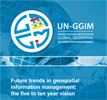At its eighth session in August 2018, the Committee of Experts requested that a third review be undertaken to understand the future trends that impacts geospatial information management over the coming five to ten years. The United Kingdom of Great Britain and Northern Ireland, through the Ordnance Survey of Great Britain, whom led the previous editions of the Future Trends report, and supported by the UN-GGIM: Europe, led this third review in close collaboration with the Secretariat. The third edition highlights changes to the trends identified in the previous two reports, showing how geospatial information and technology underpin national governments, and documenting the increasing role that geospatial information will play as part of the 2030 Agenda for Sustainable Development.
In 2019, an inclusive global engagement and consultative process was initiated that sought views on the future trends that will impact geospatial information management over the coming five to ten years. This provided the global geospatial information community the opportunity to inform the third edition of the report. In response to the many challenges and interests faced by Member States and stakeholders, it was vital to ensure that the Future Trends report assist countries in their efforts to successfully develop, augment and maintain their nationally integrated geospatial information management.
The Secretariat has initiated a broad global consultation process on the draft Future Trends report (third edition) involving Member States and relevant stakeholders. Please provide your contributions to the Secretariat no later than 26 June 2020. The Secretariat will consolidate the comments, feedback and suggestions, will ready and then provide the Future Trends report to the Committee of Experts for consideration and adoption
The first edition of the report "Future trends in geospatial information management: the five to ten-year vision" was endorsed by the United Nations Committee of Experts on Global Geospatial Information Management (UN-GGIM) at its third session in July 2013. The Future Trends report provided expert opinion on the mid to long term-developments in geospatial information and is a strategic insight document for all countries and the global geospatial information community. It is broad in nature, looking at emerging trends in technology, legal and policy, skills and training, the private and non-governmental sectors, and in the role of government.
Third Edition of Future Trends
Noting the benefits gained and the changing dynamic of geospatial information, the Future Trends report was revised in 2016. In 2018 and in order to keep pace with rapid technological change, the Committee of Experts requested that a third review should be undertaken. The United Kingdom, through Ordnance Survey, and supported by UN-GGIM: Europe, has agreed to lead this review in close collaboration with the UN-GGIM Secretariat.
We have sought stakeholders' views on the future trends that will impact the industry over the coming five to ten years. This global consultation in 2019 was an opportunity for the global geospatial information community and interested stakeholders to inform the third edition of the report.
The third edition of the Future Trends report will provide updates and include key emerging trends not previously covered, and will be prepared in three phases:
2. Gather emerging trends and write the first draft of the report (the results of which are now here); and,
3. Circulate the first draft of the report in the fourth quarter of 2019 for broad consultation and comment, and then finalise based on this feedback.


